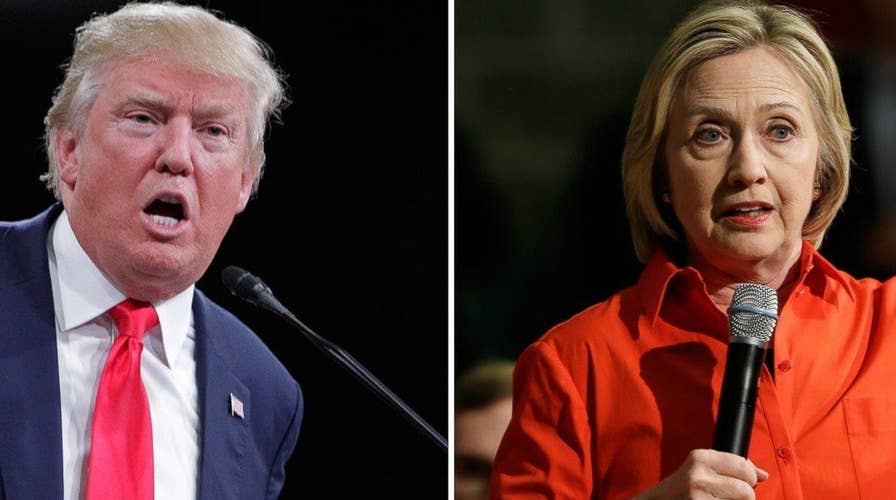Trump targets Clintons with all eyes on Iowa
The presidential candidates pull out all stops as the first caucuses in Iowa approach. 'On the Record' political panel breaks it down
The first major test for the 2016 presidential candidates is now just hours away with the Iowa Caucus on Monday -- its outcome a likely sign of whether front-running Democrat Hillary Clinton and Republican Donald Trump can hold their leads or if the unpredictable and often-angry electorate has other plans.
Trump and Clinton made their closing arguments Sunday, barnstorming across Iowa and battling on the political shows, in a final effort to beat back close rivals like Democratic candidate Sen. Bernie Sanders and Republican Sen. Ted Cruz, both eager for an upset in the first-in-the-nation balloting.
“Thirty six hours from now, the men and women of Iowa are going to caucus,” Cruz, who is trailing Trump in Iowa by roughly 5 percentage points, told “Fox News Sunday.” “And we have a grassroots army. We've got 12,000 volunteers in the state.”
Still, Cruz, who argues that he’s the true conservative in the GOP field, was, like the rest of this year’s White House candidates, steering clear of predicting a win, then having to face the fallout from a loss or even a below-expectations finish.
“Right now, this is all about turnout,” said Cruz, a Texas senator in a close race for second with Florida Sen. Marco Rubio. “This is all about who shows up tomorrow night at 7. ... If conservatives come out, we will win.”
Sanders, a Vermont independent, told ABC’s “This Week”: “I think we have a shot to win it, if people come out.”
His populist message about the economy being “rigged” against the middle class and “billionaires buying elections” has resonated with the largely disaffected and angry electorate and has posed a clear alternative to the Clinton political dynasty.
Even the supremely confident Trump, who has a double-digit national lead over the GOP field, tamped down Iowa expectations Sunday.
"I don't have to win it," he said on CBS' “Face the Nation.” “I'm doing really well with the evangelicals in Iowa. But I'm also doing tremendously well all over the country with the evangelicals. … I think we have a good chance of winning Iowa."
Still, Trump, who has a wider lead among the more independent-minded voters of New Hampshire, who vote second, on Feb. 9, realizes the importance of a lead-off victory.
“I have a very substantial lead in New Hampshire,” he told CBS. “But I think it would be really good to win Iowa. I'd like to win Iowa.”
And at least 9 percent of potential Iowa caucus-goers remain undecided, according to a Des Moines Register-Bloomberg Politics poll released Saturday.
After New Hampshire, the voting continues in South Carolina and Nevada, with the outcomes of those so-called “early-state votes” expected to winnow the GOP’s 11-candidate field.
After Trump and Cruz, Rubio is the only other GOP candidate with double-digit poll numbers.
They are followed by retired neurosurgeon Ben Carson, former Florida Gov. Jeb Bush, New Jersey Gov. Chris Christie, Kentucky Sen. Rand Paul, Ohio Gov. John Kasich, former Arkansas Gov. Mike Huckabee, former business executive Carly Fiorina and former Pennsylvania Sen. Rick Santorum.
Santorum and Huckabee, popular among social conservatives, won Iowa in 2012 and 2008, respectively.
Though none of the candidates below Rubio is expected to make a strong Iowa finish, Kasich, Christie and even Bush could do well in New Hampshire and challenge the frontrunners -- as the GOP and Democratic races head across the south and into the late spring before this summer’s nominating conventions.
Kasich was the only candidate in New Hampshire on Sunday, telling potential voters at an Elks Lodge in Salem that cutting regulations that kill small businesses would be a priority of his first 100 days, if elected president.
Trump and Cruz each attended Sunday morning church services with family members.
Trump attended services at the First Christian Orchard Campus, a nondenominational church in Council Bluffs.
Cruz went to the Lutheran Church of Hope, outside Des Moines. The sermon called on politicians to treat their opponents with love, not attack ads.
Trump has tapped into the angry electorate with plans to build a wall along the southern U.S. border to keep out “drug dealers” and others from Mexico. And in the wake of two recent terror attacks, he proposed keeping Muslim from entering the United States until the government improves its immigrant-screening process.
Amid some public outcry, Trump’s poll numbers increased by double digits after his called for the ban, in the aftermath of the San Bernardino, Calif., massacre in December.
Since Cruz emerged in recent weeks as Trump’s closest primary rival, Trump has called Cruz "a nasty guy" and a "liar," particularly about whether Trump essentially supports ObamaCare.
The only other Democratic candidate is former Maryland Gov. Martin O’Malley, who has single-digit poll numbers.
The front-running Clinton, who has a superior fundraising and campaign apparatus, continues to hold a roughly 25-point national lead over Sanders.
However, the former first lady has been stuck defending herself in a controversy about her use of a private server/email setup to conduct official business when secretary of state.
On Friday, the State Department said it had identified 22 “top secret” emails that it would not release, as part of a court order to make public Clinton’s email correspondence.
“It’s a continuation of a story that’s been playing out for months,” Clinton told ABC News.
Clinton also said that none of the emails was marked classified at the time, and she again called for their released, in an apparent effort to help end the controversy. She also suggested that Republicans were "grabbing at straws" on the issue.
“I want to see them disclosed,” she told ABC.
The Associated Press contributed to this report.





